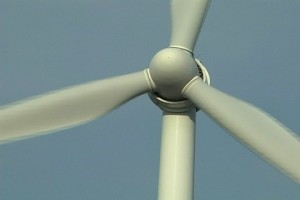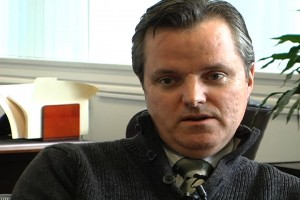 In a remote section of Western Coventry the foundations for 10 wind turbines are taking shape. Three of them are projected to produce enough electricity to save the town of West Warwick, and its taxpayers, $40 million over the next 25 years.
In a remote section of Western Coventry the foundations for 10 wind turbines are taking shape. Three of them are projected to produce enough electricity to save the town of West Warwick, and its taxpayers, $40 million over the next 25 years.
“We’ll be the first town in the state of Rhode Island — I believe the first town in New England — that would have 100% renewable electricity,’’ said Town Manager Fred Presley, who began looking into renewable energy a couple of years ago. After all, West Warwick spends nearly $1.5 million annually to power all of its municipal buildings, schools and its waste water treatment plant, which uses huge amounts of electricity.
With the help of a consultant, the town put out a detailed request for proposal for a wind project. “We expected to get answers back saying: either yes you can do this, or not any answers,” Presley said. “What we didn’t expect was to get an answer back saying: yes you can do this, and by the way they’re already sited. That was kind of icing on the cake.”
They didn’t know at the time that Mark DePasquale, a North Kingstown developer who founded Wind Energy Development in late 2009, had already received approval from the town of Coventry to build 10 turbines, two on town land, and eight on leased parcels of private land. That put West Warwick’s plans on a much faster track.
After a series of public meetings, 80% of the voters in 2014 approved borrowing $18 million to pay for three turbines in western Coventry, which the town will own outright. Presley said it was a pretty straightforward pitch.
“For a town that’s in a distressed economic state to have the ability to say: I can tell you what I’m going to pay next year on electric and I can tell you what I’m going to pay in 25 years on electric with a high level of confidence,’’ he said. “You can’t do that. You can’t tell me what you’re going to pay next month on your house and then what you’re going to pay in 25 years on that same house.”
The turbines have not come without some opposition. Coventry Town Councilwoman Karen Carlson was elected in 2012 after DePasquale had already received approval for the 10 turbines. She represents the western part of town where the 414-foot turbines are being built.
“To me the basic reason this happened is because when another town said no, we said yes,” Carlson said, adding that DePasquale had turbine proposals rejected in several other communities.
Carlson last month won unanimous approval from her fellow council members for a new wind ordinance that will require developers to go through some additional steps to put up turbines going forward. It also has provisions for decommissioning if the project fails. It won’t affect those already in the pipeline.
“This way we’re not stuck with 10 440-foot turbines that become yard art because they don’t run anymore,” Carlson said, adding that DePasquale has run into repeated delays on his turbines.
DePasquale tells The Hummel Report the delays have largely been caused by disputes with National Grid over connection costs. And for critics worried about noise and flicker he points to the 400-foot turbine he built in his own back yard, literally — right next to his house in North Kingstown.
The technology has also changed significantly over the past five years. Vensys, based in Germany, will oversee the installation of the Coventry turbines, all of which are direct-drive instead of a gearbox design, like a failed turbine the town of Portsmouth put up in 2009.
Presley says delivery of the turbines is scheduled for April, testing in May and power should be available by early June for West Warwick.
 Jim Hummel: Do you think this is a unique set of circumstances for West Warwick or do you think this is a prototype that can translate to other parts of the state?
Jim Hummel: Do you think this is a unique set of circumstances for West Warwick or do you think this is a prototype that can translate to other parts of the state?
Fred Presley: I think you’re going to see it transferring to other parts of the state absolutely. Because it’s not just the monetary issue and the issues with the grid that I spoke about, but it just makes sense to look at renewable energy for a lot of reasons.
The Hummel Report is a 501 3C non-profit organization that relies, in part, on your donations. If you have a story idea or want to make a donation go to hummelreport.org, where you can also see the video version of this story. You can mail Jim directly at jim@hummelreport.org.
